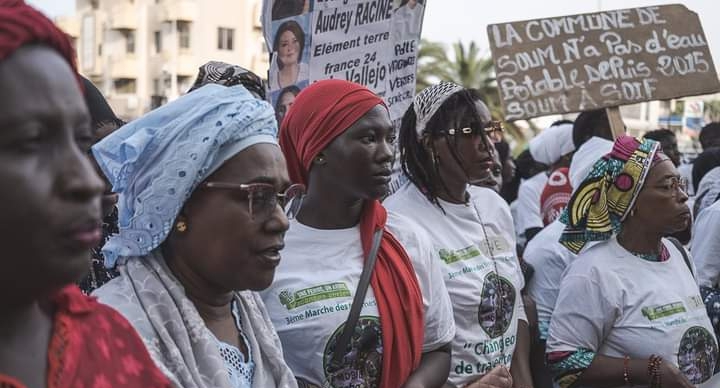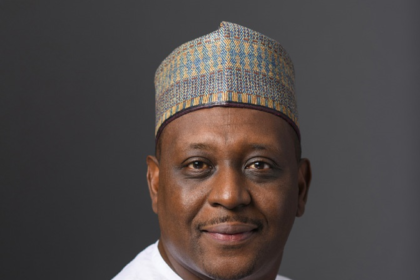By Adeyemi Adekunle
Not less 50 Senegalese women climate activists took to the streets of Dakar on Saturday, raising their voices against the climate injustices they believe are perpetuated by wealthier nations. The annual march, which has been held since 2021, comes at a crucial time as the world gears up for COP29, the latest in a series of global climate conferences aimed at addressing the pressing challenges of climate change.
As the sun shone brightly over the Medina neighborhood of Dakar, participants marched with fierce determination, chanting slogans such as “Down with capitalism! Down with polluting countries!” Their banners, emblazoned with messages demanding the protection of Senegal’s natural resources and a transition to a decarbonized future, served as a visual testament to their urgent calls for change.
For many of the women present, this march is not just an annual event, but a symbol of the ongoing struggle against the climate crisis that disproportionately affects their country. Cheikh Niange Faye, a former tour guide from Senegal’s Thiès region, expressed the frustrations felt by many activists. “It’s been four years that we’ve been marching, and nothing’s changed. They’re spending billions to hold their conferences, but they owe us billions in compensation,” she declared, referring to the historically high greenhouse gas emissions from developed nations.
This year’s march carries a heightened sense of urgency following devastating floods in recent months, which have ravaged the Sahel region and left tens of thousands of Senegalese struggling to recover. According to government figures, over 1,000 hectares of crops have been damaged, exacerbating food insecurity in an already vulnerable population.
“Climate change is real, and we’re living its impact every day,” shared Khady Camara, a lead organizer of the march and a prominent activist in Dakar. “Our communities are witnessing the consequences of a crisis we did not create. We are here to demand accountability and action, especially ahead of COP29.” Her message resonated with the crowd, igniting passions for change amid the stark realities of climate-induced hardship.
Activists argue that the responsibility of addressing climate change should not rest solely on the shoulders of developing nations like Senegal, which accounts for merely 3.8% of global emissions, according to the Carbon Disclosure Project. Instead, they insist that wealthier, industrialized nations, which have historically contributed the most to greenhouse gas emissions, must take ownership of their actions and commit to reparative measures.
One poignant representation of the impacts of climate change in Senegal comes from Khady Faye, an environmental activist who traveled from the vulnerable Saloum Delta area. “The coast is eroding at an alarming rate,” she revealed, highlighting the plight facing communities reliant on the land and sea for their livelihoods. The tangible consequences of climate change force her to advocate passionately for her community’s future.
Adding to the community’s anxiety, production at the Sangomar oil fields, Senegal’s first offshore drilling site, started this year under the ownership of Woodside Energy, which holds an 82% stake in the project. Activists worry that the acceleration of fossil fuel extraction could undermine local efforts to combat climate change while risking further environmental degradation in a country already grappling with the realities of rising sea levels and increased flooding.
As the march progressed through the streets of Dakar, participants emphasized the importance of investing in sustainable alternatives rather than continuing down the path of fossil fuel dependency. Among the crowd were farmers, educators, and young women who collectively articulated their vision for a healthier planet, free from the grip of polluting practices.
The Senegalese women’s climate march serves as a reminder of the intersection of gender, justice, and climate action. Women, who are often the primary caretakers for families and communities, bear a disproportionate burden when disasters strike. Their leadership in this space highlights the need for inclusivity in climate discussions and decision-making processes.
Camara called for global solidarity, urging attendees to remain steadfast in their resolve. “We will not stop marching until we see real change. The future of our children depends on us taking action today,” she said, with the crowd responding in unison with chants of support.
As world leaders prepare for COP29, the voices of Senegalese women climate activists seeks urgent need for accountability and meaningful action in the fight against climate change. Their fight will continue, fueled by resilience and the unwavering belief that justice is not just an ideal, but a necessary reality that must be achieved for future generations.




